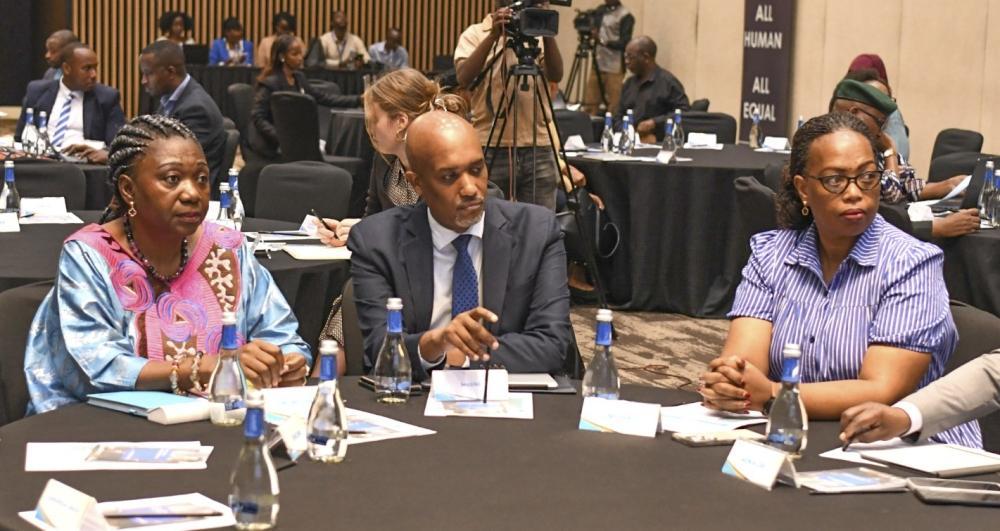Africa-Press – Rwanda. Rwanda is nearing the completion of its fourth Universal Periodic Review (UPR) report, with government officials and civil society groups acknowledging significant progress made since the last cycle in 2021.
At the National Stakeholders’ Validation Workshop, held on Tuesday, September 30, participants assessed achievements and challenges in implementing 160 recommendations Rwanda had accepted out of 284 made during its third review.
The event brought together about 80 senior representatives from government institutions, civil society, UN agencies, academia, the private sector, and development partners to validate the final draft before submission to the Geneva-based UN Human Rights Council.
Minister of Justice Emmanuel Ugirashebuja emphasized that Rwanda has successfully implemented over 95 percent of the accepted recommendations, reflecting the country’s commitment to human rights.
“In January 2021, Rwanda underwent its third UPR and accepted 160 recommendations. Over the past four and a half years, we have made significant progress through legal reforms, institutional measures, and inclusive policies,” he said.
Ugirashebuja pointed to reforms coordinated under the National Mechanism for Implementation, Reporting, and Follow-up, which brought together the government, Parliament, the Judiciary, the National Human Rights Commission, civil society, the media, and development partners. According to minister, the process was participatory and reflects Rwanda’s conviction that “human rights are a shared endeavor.”
Ugirashebuja emphasized that Rwanda’s human rights agenda is grounded in national ownership and constitutional obligations, rather than mere external compliance.
“We do not act simply to comply with Geneva, but because promoting human rights is our sovereign duty,” he said, adding that progress is closely tied to the country’s development frameworks, including the just-concluded National Strategy for Transformation (NST1), NST2, and Vision 2050.
Speaking on behalf of the UN Resident Coordinator, Jennet Kem, UN Women Representative, commended Rwanda for its strong engagement with the UPR process.
“Since Rwanda’s last UPR in 2021, we have witnessed important reforms, including judicial measures to reduce case backlogs and the creation of the Ministry of National Unity and Civic Engagement to foster social cohesion,” Kem said.
She highlighted progress in healthcare, education, gender equality, and poverty reduction, noting that Rwanda continues to lead globally in women political representation.
Kem also recalled Rwanda’s five pledges during the 75th anniversary of the Universal Declaration of Human Rights in 2023: advancing restorative justice, developing a Business and Human Rights Action Plan, ensuring a human rights-sensitive NST2, continuing media reforms, and contributing to migration and asylum solutions.
“The UN will continue supporting these initiatives,” she said, adding that Rwanda’s openness to treaty bodies and special rapporteurs demonstrates a commitment to international cooperation.
Alongside government reports, the Rwanda Civil Society Coalition on UPR, coordinated by the Legal Aid Forum (LAF), also presented its independent assessment.
According to Andrews Kananga, its executive director, Rwanda has made commendable progress, particularly in gender equality, education, health, and protection of vulnerable groups. “Our findings show about 99 percent convergence with the government’s report,” he noted.
However, challenges remain, according to the coalition, which recommends that the government allocate sufficient financial and human resources to implement laws, policies, and human rights programs.
Furthermore, they recommend that the government strengthen citizen participation in the design, monitoring, and evaluation of laws and policies, accelerate ratification and implementation of key international human rights instruments, including those related to labour rights, enforced disappearance, and domestic workers.
What has been achieved?
Achievements include expanded Irembo e-services from 89 to 220, improved citizen satisfaction with decentralized services, and strengthened anti-corruption frameworks. More than 3,000 security and justice officials were trained on due process and prevention of torture, while thousands of vulnerable people received legal aid.
In the justice sector, the report indicates that over 22,000 cases were resolved through plea bargaining and thousands more via court-annexed mediation.
In governance, asset declaration compliance improved, and citizen satisfaction with local services rose from 76.2 percent in 2023 to 89.6 percent in 2024.
In the health sector, the community-based health insurance now covers nearly the entire population; mental health services expanded, and in education, over 2,700 classrooms and 650 schools were built to reduce overcrowding, while more than 17,000 teachers received training, including in human rights pedagogy.
Moreover, in the environment, the Rwanda Green Fund mobilized $247 million, creating over 100,000 green jobs and restoring degraded land.
The country’s fourth UPR review is scheduled for January 2026.
For More News And Analysis About Rwanda Follow Africa-Press






